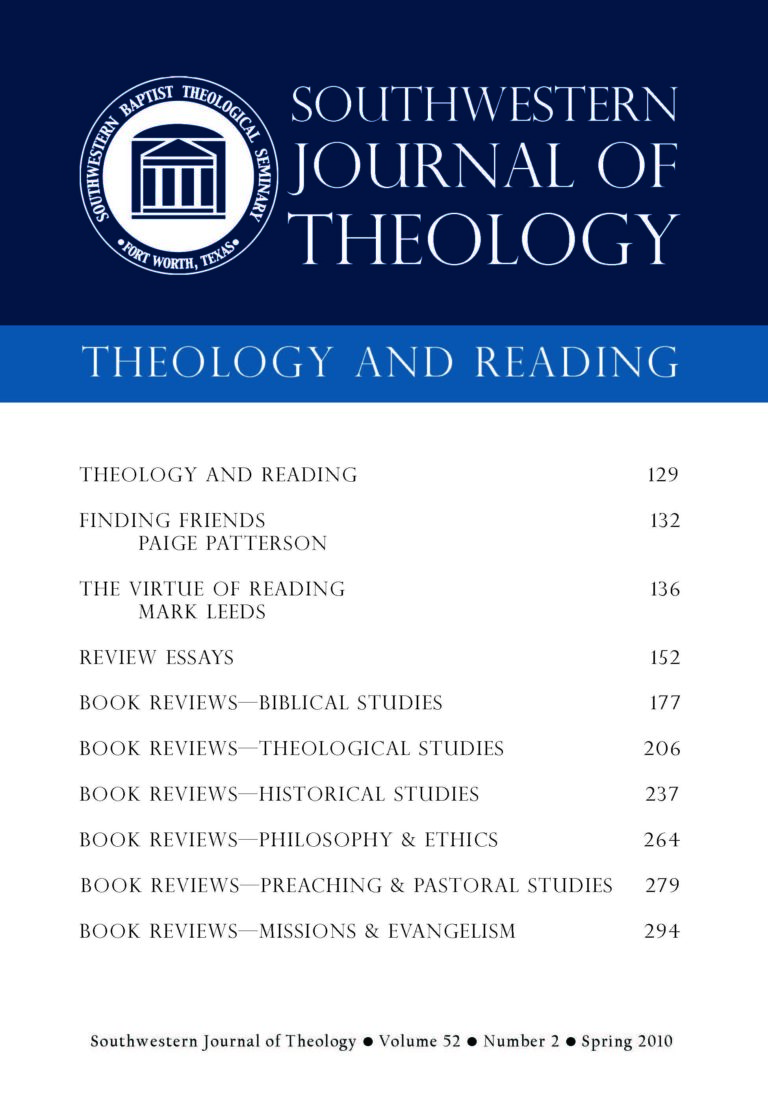
Theology and Reading
Southwestern Journal of Theology
Volume 52, No. 2 – Spring 2010
Managing Editor: Malcolm B. Yarnell III
By Donald T. Williams. St. Louis, MO: Chalice, 2008. Softcover, $16.99.
Theology is serious business. Spending eternity in hell is not funny, and the incredible cost to the Father, Son, and Holy Spirit to bring about personal redemption is humbling and not a laughing matter. That said, Christians as the followers of Jesus Christ are hilarious. Sometimes they are irritating, but I find more times than not that we, with our stumbling, bumbling attempts to follow our Lord, create a host of reasons to be heartbroken before God and to experience the joys of repentance. Beyond that, we need to recover a sense of humor and learn to laugh at ourselves and, yes, at one another.
Perhaps this is why Donald T. Williams’ The Devil’s Dictionary of the Christian Faith was such a delight to my soul. Williams is Professor of English at Toccoa Falls College in Georgia, but he shows quite a grasp of theology, philosophy, and the life of the church in this superb dictionary. Doubtless inspired in part by C. S. Lewis’s Screwtape Letters, The Devil’s Dictionary of the Christian Faith is what the theologian and the pastor need to read just before they go to bed at night. What makes a dictionary full of misdefinitions so delightful is that each definition, like the devil himself, tends to have just enough of the truth to make it painful in a delightful sort of way. For example, heaven is defined as “The eternal abode of those like us; where we will live in everlasting bliss and harmony with those about whom we gossiped on the earth” (44). Or, for example, dispensationalism is defined as “The doctrine that God dispensed with continuity in constructing His plan for the ages” (30).
The book delightfully spares no one, whether a famous and revered figure from the past or a contemporary leader in the church. In fact, as a good satirist ought, Williams does not even spare himself and those who worked with him. Protestants and Catholics, Baptists and Charismatics, scholars and congregations all take it on the chin but in a cogent and respectful manner even if sometimes one winces just a bit. For example, divorce is defined as “A social expedient that Christians condemn more than anybody else and practice just a much. Once committed, it becomes the Unpardonable Sin, unless one is a Media Personality. Then a period of mandatory penance, Counseling, (q.v.) and rehabilitation is imposed: five minutes for popular recording artists, ten for media preachers. Preachers not blessed by the Media (q.v.) get no reprieve” (30).
One of the most remarkable achievements of the book is that while the book is side splitting, it is as clean as the proverbial hound’s-tooth. About the closest thing to being “edgy” (the modern word for “pulpit vulgarity”) is the definition of Papal Bull, which is defined as “An official proclamation by the Pope (q.v.) which adds to the Deposit of Faith; so named from its resemblance to deposits left by certain large bovine mammals” (13). Just to have a book of clean humor that one can place in the hands of people who are much too serious about themselves is a fabulous blessing from God.
An additional blessing of the book is that many of the definitions have limericks associated with them—some of which are really quite good. In defining Mission Trip, Williams gives us the following:
A good definition of pain
Is the agony, suffering, and strain
You inflict on your knee
When you force it to be
Between two coach seats on a plane (58).
Or again, regarding Blaise Pascal, he writes:
There is a Pascal, name of Blaise,
Who has a great game that he plays.
“I’ll make you a Wager:
Now, which would be sager?”
God is; He is not. Which one pays? (64)
On almost every entry, I smiled. Some were so hysterical that they brought a guffaw. On this one I laughed until I hurt. Defining Health and Wealth, Williams wrote: “That which flows from the gullible to the Televangelist. The temporal reward that naturally comes to those with the spiritual gifts of direct-mail fundraising, a charismatic personality, and a plentiful lack of conscience. That which they promise to their followers, who are obviously too spiritual to join the long line of humble, persecuted, suffering martyrs who constituted the membership of the Church in a more benighted age” (43). Preachers, Church Music, Pianos, Organs, and just about everything else about church, theology, and seminary are brought under Williams’ microscope and subjected to loving harassment. The four appendices in the back are equally delightful.
To read through the entire book will take less than two hours even if you read as slowly as this reviewer. But whatever you do, do not miss The Devil’s Dictionary of the Christian Faith. In what may be unintended (but I suspect is quite intentional), you will actually get a look at some of what the devil really does want to inflict on the church of God. This slender volume is fun, perceptive, and something of the defense for the believer against the devil who, in his traditional appearance, is pictured at the top of every other page in the book.





